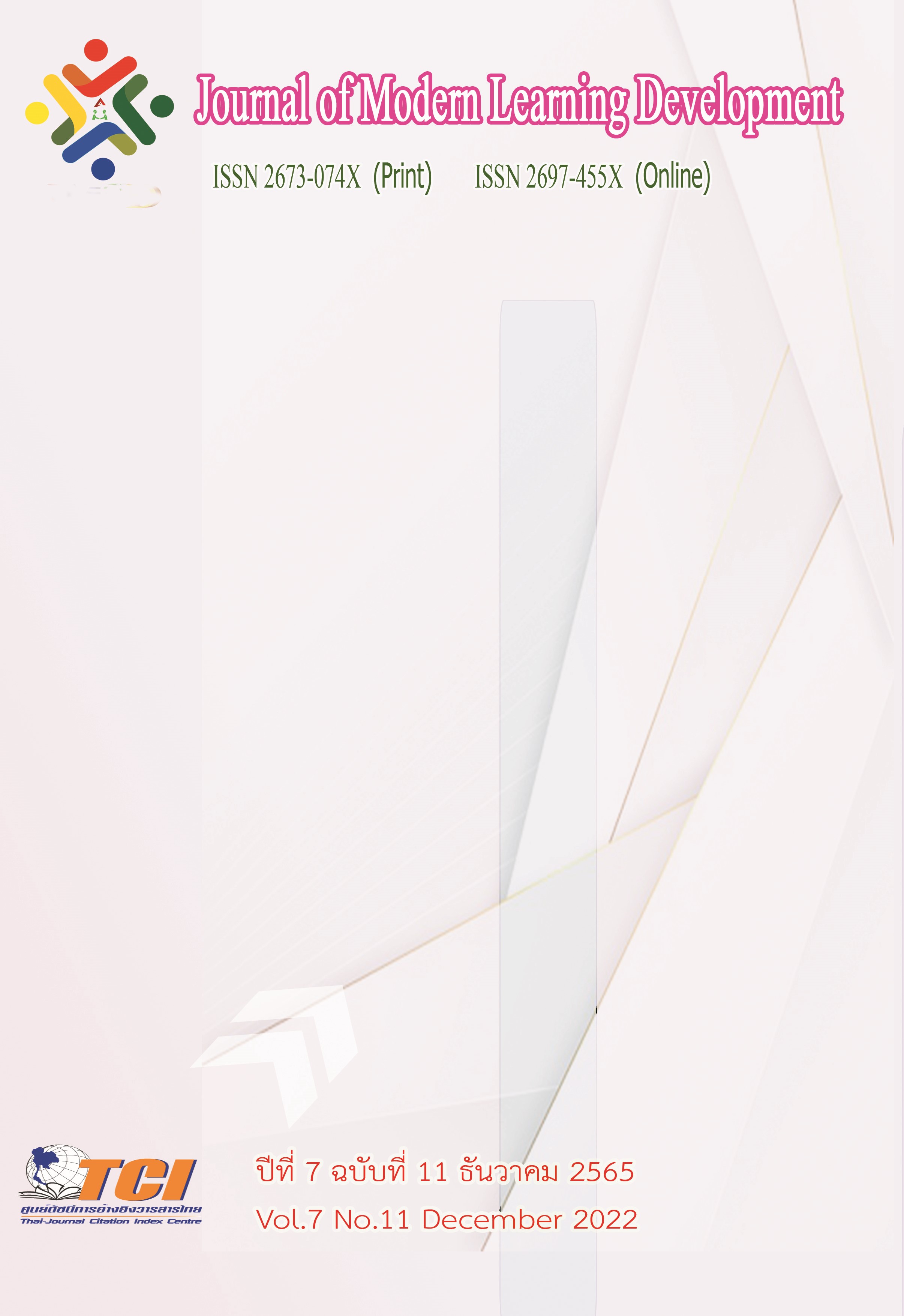Factors Affecting Loyalty Organizational of Teachers at Private Schools of Thailand
Main Article Content
Abstract
The objectives of the research study were: 1) study the mean of Supervisor Support, Trust, Commitment and Job Satisfaction with Loyalty 2) study the relationship of Supervisor Support, Trust, Commitment and Job Satisfaction and Loyalty, and 3) create an equation for predicting Loyalty of teacher. The multi-stage random sampling method was used to select 1,000 teachers of private school in Thailand. The instrument for data collection in this research was a questionnaire. Data analysis were descriptive statistics, Pearson's product moment correlation coefficient and stepwise multiple regression analysis was using package software.
The major findings of this study are as follows: Supervisor Support (SUP) had the highest average, followed by Loyalty (LOY), Job Satisfaction (SAT), Commitment (COM), and Trust (TRU). 2) Four independent variables: Supervisor Support, Trust, Commitment and Job Satisfaction were related to Loyalty (LOY) at a significance level of .05 and 3) Four independent variables: Supervisor Support, Trust, Commitment and Job Satisfaction can predict the variance of the Loyalty (LOY) of 93.60 percent. Supervisor Support (SUP) and Job Satisfaction (SAT) was the best predictor variable and had standardized coefficients = .487 and Commitment (COM) was the lowest predictor variable and had standardized coefficients = .040. In the next research should be study more independent variables such as work environment, teamwork and motivation.
Article Details
References
ชัชวาล อรวงศ์ศุภทัต. (2564). ความจงรักภักดี = โอกาสทางธุรกิจ HR ต้องสรรหาคนแบบไหนมาทำงาน ?. ออนไลน์. สืบค้น 2 ตุลาคม 2565. แหล่งที่มา: https://www.jobbkk.com/variety/detail/5378
ชินวัฒน์ ปานมั่งมี. (2563). ภาวะผู้นำเชิงคุณภาพของผู้บริหารกับการ ดำเนินงานวัฒนธรรมในสถานศึกษา สังกัดสำนักงานเขตพื้นที่การศึกษาประถมศึกษาประจวบคีรีขันธ์ เขต 2. วารสารศิลปการจัดการ. 4 (3), 686 - 699.
นิดา แก้วสว่าง และ รุ่งชัชดาพร เวหะชาติ. (2561). ปัจจัยการคงอยู่ของครูโรงเรียนเอกชนตามความคิดเห็นของครูสังกัดสำนักงานเขตพื้นที่การศึกประถมศึกษาสงขลาเขต 2 จังหวัดสงขลา. วารสารการบริหารและนวัตกรรมการศึกษา. 2 (3), 53 - 70.
บุญชม ศรีสะอาด. (2556). วิธีการทางสถิติสำหรับการวิจัย เล่ม 1. (พิมพ์ครั้งที่ 5). กรุงเทพมหานคร: สุวีระยาสาส์น.
ประภาศ ปานเจี้ยง. (2562). วันครู รัฐบาลดูแลครูเอกชน. ออนไลน์. สืบค้น 2 ตุลาคม 2565. แหล่งที่มา: https://www.matichon.co.th/article/news_1317529.
ราชบัณฑิตยสถาน. (2546). พจนานุกรม ฉบับบัณฑิตยสถานพุทธศักราช 2542. กรุงเทพมหานคร: นานมีบุกส์พับลิเคชั่น.
สำนักงานคณะกรรมการส่งเสริมการศึกษาเอกชน. (2564). รายงานประจำปี 2564. ออนไลน์. สืบค้น 2 ตุลาคม 2565. แหล่งที่มา: https://shorturl.asia/I6mUO
Colquitt, J. A., Lepine, J. A. and Wesson, M. J. (2009). Organizational Behavior : ImprovingPerformance and Commitment in the Workplace. Singapore : McGraw-Hill.
Durkin, D. M. (2005). The Loyalty Advantage : Essential steps to energize your company, your customer, your brand. New York : AMACOM.
Gibson, J. L., Ivancevich, J.M., Donnelly, J.H. and Konopaske, R. (2006). Organizations : Behavior,Structure, Processes. 12rd ed. New York : McGraw-Hill.
Griffin, R. W. and Moorhead, G. (2007). Organizational Behavior Managing People and Organizations. 8th ed. Boston, New York : Houghton Mifflin.
Handayani, Z. T., Wibowo, Umar, H., & Sitinjak, T. (2021). Loyalty of Traditional Food Small
Industry Employees. International Journal of Arts and Social Science. 4 (4), 275-292.
Khuong, M. N., & Tien, B. D. (2013). Factors influencing employee loyalty directly and indirectly through job satisfaction–A study of banking sector in Ho Chi Minh City.International Journal of current research and academic review. 1 (4), 81-95.
Lewicka, D., Glinska-Newes, A., Morrow, D., & Gorka, J. (2018). The effect of job characteristics
on employee loyalty: The mediation role of vertical trust and perceived supervisory support. Marketing and Management of Innovations, 2, 168-185.
Likert, R. (1932). A technique for measurement of attitudes. Archives of Psychology. 140, 3-55. Retrieved from https://legacy.voteview.com/pdf/Likert_1932.pdf
Ngo, Q. V., Tran, T. Q. and Luu, T. C. (2021). Corporate social responsibility and employee loyalty: Role of pride and commitment. Proceedings of the International Conference
on Research in Management & Technovation, 28, 237–242.
Robbins, S. P. (2005). Essentials of Organizational Behavior. 8th ed. Upper Saddle River, New
Jersey : Prentice-Hall.
Robbins, S. P. and Judge, T. A. (2009). Organizational Behavior. Upper Saddle River, New Jersey : Prentice-Hall.
Sihombing, S. O., Berlianto, M. P. (2017). Antecedents of Employee Loyalty in Educational Setting: An Empirical Study. International Research Journal of Business Studies, 10
(2), 99-109.
Singh, P. (2022). Interpersonal Trust, Employee Satisfaction, and Employee Loyalty: A Social
Research Study. Journal of Contemporary Issues in Business and Government, 28 (4),
-767.
Vilares, M. J. and Coelho, P. S. (2003). The employee-customer satisfaction chain in the ECSI. European of Marketing 37 (11/12) : 1703-1722.


